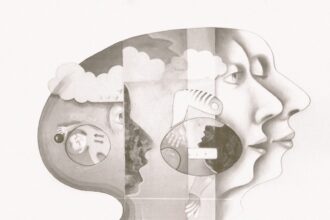Depersonalization and derealization are psychological phenomena that can leave you feeling detached from your own thoughts, feelings, or sense of self. When you experience depersonalization, it may feel as though you are an observer of your own life, as if you are watching yourself from a distance. This can lead to a profound sense of disconnection from your body and emotions, making it difficult to engage fully with the world around you.
On the other hand, derealization involves a sense of unreality regarding your surroundings. You might perceive the world as foggy, dreamlike, or distorted, leading to feelings of confusion and anxiety. These experiences can be unsettling and disorienting, often leaving you questioning your own reality.
While they can occur in isolation, they are frequently associated with stress, trauma, or anxiety disorders. Understanding these phenomena is crucial for recognizing their impact on your mental health and well-being. By gaining insight into what depersonalization and derealization entail, you can better navigate the challenges they present and seek appropriate support.
Key Takeaways
- Depersonalization and derealization are experiences where individuals feel disconnected from themselves and their surroundings.
- Symptoms of depersonalization include feeling like an outside observer of one’s thoughts and actions, while derealization involves feeling like the world is unreal or distorted.
- Trauma, stress, anxiety, and substance abuse are common triggers for depersonalization and derealization.
- Depersonalization and derealization can significantly impact daily life, leading to difficulties in relationships, work, and overall functioning.
- Seeking professional help is crucial for diagnosing and treating depersonalization and derealization, and there are various treatment options and coping strategies available.
Symptoms and Experiences of Depersonalization and Derealization
The symptoms of depersonalization and derealization can vary widely from person to person. You may find yourself feeling emotionally numb or disconnected from your thoughts, as if they belong to someone else. This can manifest as a sense of being robotic or mechanical in your actions, leading to a feeling of being trapped in your own body.
You might also experience a distorted perception of time, where moments seem to stretch or compress in ways that feel unnatural. In terms of derealization, you may notice that familiar places appear strange or unfamiliar. Everyday objects might seem altered or lacking in depth, contributing to a sense of unreality.
You could also experience heightened sensory perceptions, where sounds become amplified or colors appear more vivid than usual. These symptoms can be distressing and may lead to increased anxiety or panic, as you grapple with the fear of losing touch with reality.
Causes and Triggers of Depersonalization and Derealization

Understanding the causes and triggers of depersonalization and derealization is essential for managing these experiences effectively. Often, these phenomena arise in response to overwhelming stress or trauma. You might find that significant life events—such as the loss of a loved one, a traumatic accident, or prolonged exposure to stressful situations—can trigger episodes of depersonalization or derealization.
In some cases, these experiences serve as a coping mechanism, allowing you to distance yourself from emotional pain or distress. Additionally, certain mental health conditions can predispose you to these experiences. Anxiety disorders, depression, and post-traumatic stress disorder (PTSD) are commonly associated with depersonalization and derealization.
Substance use can also play a role; for instance, the use of hallucinogenic drugs or excessive alcohol consumption may lead to feelings of detachment. By identifying potential triggers in your life, you can take proactive steps to mitigate their impact and seek appropriate support.
The Impact of Depersonalization and Derealization on Daily Life
| Impact of Depersonalization and Derealization on Daily Life |
|---|
| Difficulty in forming and maintaining relationships |
| Impaired ability to concentrate and focus |
| Decreased productivity at work or school |
| Feelings of detachment from oneself and the world |
| Increased anxiety and stress levels |
| Challenges in making decisions and problem-solving |
| Impact on overall quality of life and well-being |
The impact of depersonalization and derealization on your daily life can be profound. You may find it challenging to engage in social situations or maintain relationships due to feelings of disconnection. This detachment can lead to isolation, as you might struggle to communicate your experiences to others who may not understand what you’re going through.
Everyday tasks may become overwhelming when you feel detached from your own body or surroundings, making it difficult to concentrate or perform routine activities. Moreover, the emotional toll of these experiences can contribute to anxiety and depression. You might feel frustrated by your inability to control these sensations, leading to a cycle of negative thoughts and feelings.
This can further exacerbate feelings of hopelessness or despair. Recognizing the impact that depersonalization and derealization have on your life is crucial for seeking help and finding effective coping strategies.
Diagnosing Depersonalization and Derealization
Diagnosing depersonalization and derealization typically involves a comprehensive evaluation by a mental health professional. During this process, you will likely discuss your symptoms in detail, including their frequency, duration, and any potential triggers you’ve identified. The clinician may also inquire about your medical history and any co-occurring mental health conditions that could be contributing to your experiences.
It’s important to note that depersonalization and derealization are classified as dissociative disorders in the Diagnostic and Statistical Manual of Mental Disorders (DSM-5). To receive a diagnosis, your symptoms must cause significant distress or impairment in social, occupational, or other important areas of functioning. By working closely with a mental health professional, you can gain clarity about your experiences and develop an appropriate treatment plan tailored to your needs.
Treatment Options for Depersonalization and Derealization

When it comes to treating depersonalization and derealization, various options are available depending on the severity of your symptoms and any underlying conditions. Psychotherapy is often considered one of the most effective approaches for addressing these experiences. Cognitive-behavioral therapy (CBT) can help you identify negative thought patterns associated with depersonalization and derealization while teaching coping strategies to manage anxiety.
In some cases, medication may be prescribed to address co-occurring conditions such as anxiety or depression that contribute to your experiences. Antidepressants or anti-anxiety medications may help alleviate symptoms and improve overall functioning. However, it’s essential to work closely with a healthcare provider to determine the most appropriate treatment plan for your unique situation.
Coping Strategies for Managing Depersonalization and Derealization
In addition to professional treatment options, there are several coping strategies you can employ to manage depersonalization and derealization effectively. Grounding techniques can be particularly helpful in reconnecting with your body and surroundings when you feel detached. For instance, focusing on your breath or engaging in mindfulness exercises can help anchor you in the present moment.
These lifestyle factors can significantly impact your mental well-being and help reduce the frequency of episodes. Additionally, journaling about your experiences can provide an outlet for processing emotions and gaining insight into potential triggers.
Understanding the Connection Between Depersonalization/Derealization and Other Mental Health Conditions
Depersonalization and derealization often coexist with other mental health conditions, making it essential to understand their interconnectedness. For instance, individuals with anxiety disorders frequently report episodes of depersonalization as a response to heightened stress levels. Similarly, those with PTSD may experience dissociative symptoms as a way to cope with traumatic memories.
Recognizing this connection can help you better understand your experiences and seek appropriate treatment for any co-occurring conditions. By addressing both the dissociative symptoms and underlying mental health issues simultaneously, you can work towards achieving greater stability and improved overall well-being.
How to Support Someone Experiencing Depersonalization and Derealization
If someone close to you is experiencing depersonalization or derealization, offering support can make a significant difference in their journey toward healing. Start by creating a safe space for open communication where they feel comfortable sharing their experiences without judgment. Listening actively and validating their feelings can help them feel understood and less isolated.
Encourage them to seek professional help if they haven’t already done so. You might offer to accompany them to appointments or assist them in finding resources related to treatment options. Additionally, educating yourself about depersonalization and derealization can enhance your ability to empathize with their struggles while providing informed support.
The Importance of Seeking Professional Help for Depersonalization and Derealization
Seeking professional help for depersonalization and derealization is crucial for several reasons. First and foremost, mental health professionals possess the expertise needed to accurately diagnose these conditions and develop tailored treatment plans that address individual needs. They can provide valuable insights into coping strategies while helping you navigate the complexities of your experiences.
Moreover, engaging in therapy offers a safe environment where you can explore the underlying causes of your symptoms without fear of judgment. This therapeutic relationship can foster healing by allowing you to process emotions related to trauma or stressors that may have contributed to your dissociative experiences. Ultimately, seeking professional help is an essential step toward regaining control over your life.
Research and Future Directions in Understanding Depersonalization and Derealization
Research into depersonalization and derealization is ongoing, with scientists striving to uncover the underlying mechanisms that contribute to these phenomena. Recent studies have explored the neurobiological aspects of dissociation, examining how brain activity differs during episodes of depersonalization compared to normal states of consciousness.
Future directions in this field may include developing more effective treatment modalities tailored specifically for individuals experiencing depersonalization and derealization. As awareness grows regarding these conditions, there is hope for increased funding for research initiatives that focus on improving diagnostic criteria and treatment options. By continuing to explore the complexities of these phenomena, we can work towards better outcomes for those affected by depersonalization and derealization.
In conclusion, understanding depersonalization and derealization is vital for recognizing their impact on mental health and daily life. By exploring symptoms, causes, treatment options, coping strategies, and support systems available for individuals experiencing these phenomena, you can take proactive steps toward managing your experiences effectively while fostering greater awareness within society at large.
Depersonalization and derealization are common symptoms often associated with dissociative disorders, particularly Depersonalization-Derealization Disorder. These symptoms can cause individuals to feel disconnected from themselves or their surroundings, leading to significant distress and impairment in daily functioning. For more in-depth information on this topic, you can explore a related article on the subject by visiting




